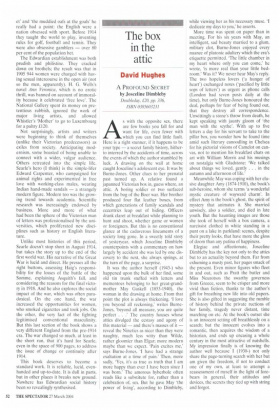The box in the attic
David Hughes
A PROFOUND SECRET by Josceline Dimbleby Doubleday, £20, pp. 336, ISBN 0385603231 As with the opposite sex, there are few books you fall for and want for life, even fewer with which you can find little fault. Here is a right stunner, if it happens to be your type — a secret family history, hitherto interred by the accidents of time, across the events of which the author stumbled by luck. A drawing on the wall at home caught Josceline's adolescent eye. It was by Burne-Jones. Other clues to her prenatal past turned up. A relative found a japanned Victorian box in, guess where, an attic. A boring soldier or two surfaced from the bog of the Boer war. Her brother produced four flat leather boxes, from which generations of family scandals and eccentrics leap out of hiding. Officers drank claret at breakfast while planning to hunt and shoot, whether game or women or foreigners. But this is no conventional glance at the cadaverous lineaments of a society long gone. In a sweetly told story of yesteryear, which Josceline Dimbleby counterpoints with a commentary on how largely by accident she was led by one discovery to the next, she always springs, at the turn of the page, a surprise.
It was the author herself (1943-) who happened upon the bulk of her find, some old tin trunk stuffed with letters and mementoes belonging to her great-grandmother May Gaskell (1853-1940), the woman in the drawing at home. From that point the plot is always thickening. 'I love you beyond all reckoning,' writes BurneJones, 'beyond all measure, you are quite perfect . . .' The country houses whose attics divulged the ecstasy and agony of this material — and there's masses of it — reveal the Nineties as nicer than they were naughty, much less witty than Wilde, rather gloomier than Elgar; more modern maybe than we expect. 'Pain excites me,' says Burne-Jones, 'I have had a strange exaltation at a time of pain.' Then, more sadly, 'Yes, it's as true as truth that I am more happy than ever I have been since I was born.' The amorous hyberbole often reads like a substitute for, rather than a celebration of, sex. But he gave May 'the power of living', according to Dimbleby,
while viewing her as his necessary muse. 'I dedicate my days to you,' he asserts.
More time was spent on paper than in meeting. For his six years with May, an intelligent, sad beauty married to a glum, military clot, Burne-Jones enjoyed every nuance of platonic adultery which the era's etiquette permitted. 'The little chamber in my heart where only you can come,' he wrote, 'is more real than your little bedroom.' Was it? We never hear May's reply. The two hopeless lovers (a hunger of heart') exchanged notes (pacified by little sops of letters') as urgent as phone calls (London had seven posts daily at the time), but only Burne-Jones honoured the deal, perhaps for fear of being found out, that they destroy all correspondence. Unwittingly a stone's throw from death, he kept speaking with jaunty gloom of 'the man with the scythe'. With up to five letters a day for his servant to take to the pillar box, you wonder how he found time amid such literary canoodling in Chelsea for his pictorial visions of Camelot on canvas, not to mention his breakfast chats on art with William Morris and his musings on nostalgia with Gladstone: 'We talked about things we loved, gently . in the autumn and afternoon of life.'
Meanwhile May was coping with her elusive daughter Amy (1874-1910), the book's sub-heroine, whom she terms 'a wonderful mystic creature of wayward charm'. In effect Amy is the book's ghost, the spirit of mystery that animates it. She married unwisely, also a soldier, and died in late youth. But the haunting images are those she took of herself with a box camera, a narcissist clothed in white standing in a punt on a lake in parkland: scenes, despite their pretty looks, that have more the gloss of doom than any patina of happiness.
Elegiac and affectionate, Josceline Dimbleby has the key not only to the attics but to an actuality beyond them. Far from exhuming a musty past, her pages smack of the present. Even minor figures who fleet in and out, such as Pratt the butler and Miss Neurotsos the swarthy governess from Greece, seem to be crisper and more vivid than fiction, thanks to the author's gift for breathing new life into old papers. She is also gifted in suggesting the rumble of history behind the private ructions of her family, tragedy never distant, time marching on etc. At the book's outset she is an innocent setting off breathlessly on a search; but the innocent evolves into a romantic, then acquires the wisdom of a historian, and ends up encasing a whole century in the most attractive of nutshells. My impression finally is of knowing the author well because I (1930-) not only share the page-turning search with her but am given the freedom, if not to conduct one of my own, at least to attempt a reassessment of myself in the light of forebears in general, their attitudes and devices, the secrets they tied up with string and forgot.


























































































 Previous page
Previous page